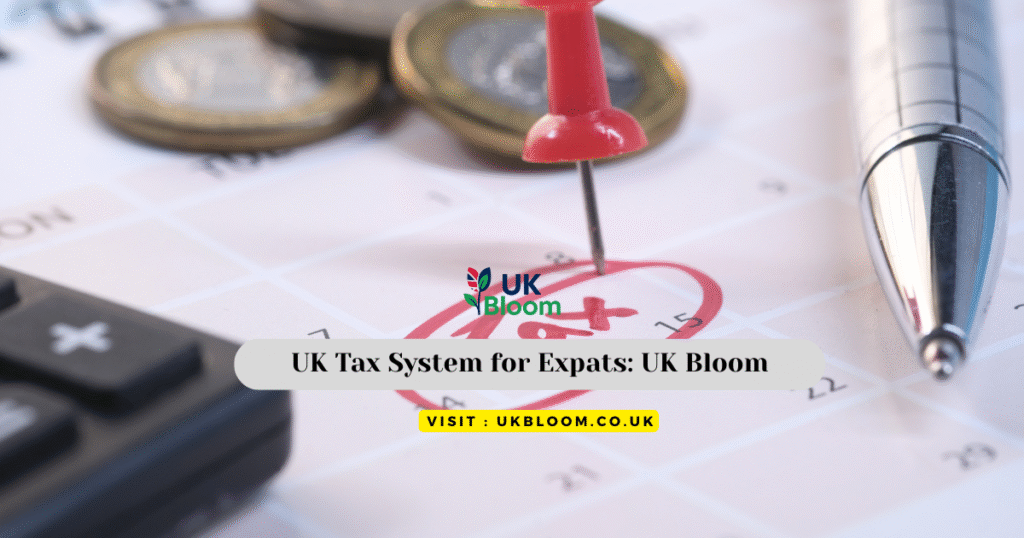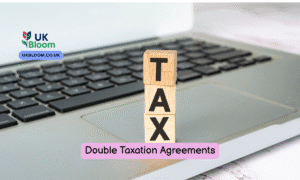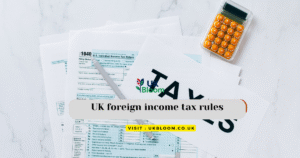Understanding the UK Tax System for Expats living or working in the United Kingdom. Whether you’re employed, self-employed, or retired, this guide explains everything from residency rules and income tax bands to national insurance, double taxation treaties, and filing requirements.
Note: This article is for informational purposes only. Always consult the UK Home Office or a qualified tax adviser for personalized guidance.
Table of Contents
UK Tax System for Expats
Residency and Tax Liability
Your UK tax liability depends primarily on your tax residency status, determined under the Statutory Residence Test (SRT). You are considered a UK resident for tax purposes if:
- You spend 183 days or more in the UK in a tax year, or
- Your only home is in the UK for at least 91 consecutive days, and you spend at least 30 days there,
- You work full-time in the UK for 365 days.
If you do not meet these conditions, you are classed as a non-resident and are only taxed on UK-sourced income.
Income Tax Rates for Expats (2025)
If you’re classed as a UK tax resident, you’re subject to income tax on your worldwide income. For the 2025/26 tax year, the tax bands are:
| Band | Taxable Income | Rate |
|---|---|---|
| Personal Allowance | Up to £12,570 | 0% |
| Basic Rate | £12,571 to £50,270 | 20% |
| Higher Rate | £50,271 to £125,140 | 40% |
| Additional Rate | Over £125,140 | 45% |
Note: Personal Allowance tapers off for income over £100,000.
Check updated rates on HMRC’s official website.
National Insurance Contributions
National Insurance (NI) funds public benefits like the NHS and state pension. Expats working in the UK may have to pay:
| Class | Applicable To | Rate |
|---|---|---|
| Class 1 | Employees | 8%–12% (varies) |
| Class 2 | Self-employed | Flat £3.45/week |
| Class 4 | Self-employed profits over £12,570 | 9%–2% |
You may be exempt if your home country has a Social Security Agreement with the UK.
More info: National Insurance if you work abroad
Double Taxation Agreements (DTAs)
The UK has Double Taxation Agreements with over 130 countries, allowing expats to avoid being taxed twice on the same income.
Check your country’s treaty with the UK at the UK government’s DTA list.
You may be able to claim tax relief through:
- Foreign Tax Credit Relief
- Tax Treaty Exemptions
- Split Year Treatment
Taxable and Non-Taxable Income
As a UK tax resident, these income types are taxable:
- Employment income (UK and abroad)
- Self-employment profits
- Rental income from UK or foreign property
- Interest and dividends
- Pensions (UK and overseas)
- Capital gains on worldwide assets
Non-taxable income may include:
- Premium Bond winnings
- Lottery winnings
- Certain state benefits (e.g. Housing Benefit)
- Gifts and inheritance (up to thresholds)
Tax Obligations for Different Income Types
Employment Income
If you’re employed in the UK, tax is typically deducted automatically through PAYE (Pay As You Earn). You must check your tax code to avoid overpayment.
Self-Employment
Self-employed expats must register with HMRC and file a Self Assessment tax return annually. National Insurance also applies (Class 2 and 4).
Foreign Income
You must declare foreign income, such as:
- Overseas salary
- Foreign investments
- Property rental income
- Dividends
Use the Foreign Income pages in your Self Assessment return.
Filing a Self-Assessment Tax Return
You must file a tax return if:
- You’re self-employed
- You have foreign income
- You have over £1,000 in untaxed income
- You receive rental income
Deadlines:
- Register: 5 October following the tax year
- Online filing: 31 January
- Payment: 31 January and 31 July (if payments on account apply)
Capital Gains Tax for Expats
You may owe Capital Gains Tax (CGT) on:
- Property sales (UK or global)
- Business asset sales
- Shares or crypto disposals
2025 Rates:
| Asset Type | Basic Rate | Higher Rate |
|---|---|---|
| Property | 18% | 28% |
| Shares/Assets | 10% | 20% |
Expats may be eligible for Private Residence Relief, Annual Exempt Amount, or Rollover Relief.
Inheritance Tax Implications
If you are domiciled in the UK, your worldwide estate may be subject to Inheritance Tax (IHT) at 40% on amounts over £325,000.
Even non-domiciled individuals may be taxed on UK-based assets.
Learn more: UK Inheritance Tax rules
Pension Taxation for Expats
UK Pensions
Income from a UK pension is subject to UK income tax, unless a DTA assigns it to your home country.
Foreign Pensions
Foreign pensions may be taxed in the UK if you’re a UK resident, although relief is sometimes available.
QROPS (Qualifying Recognised Overseas Pension Schemes) allow expats to move their pension abroad — but recent UK rule changes have added tax implications.
Avoiding Common Tax Mistakes
- Ignoring residency rules and becoming liable for full UK tax
- Not declaring foreign income and risking HMRC penalties
- Missing filing deadlines
- Incorrect tax codes
- Relying solely on employer for tax matters
Use a tax adviser with international experience to stay compliant.
Useful Tools and Resources
Internal Resources on UKBloom
- UK Skilled Worker Visa Guide
- UK Income Tax Calculator
- Cost of Living in the UK for Expats
- UK Pension Options for Expats
- Visa and Immigration Calculators
Final Thoughts
Managing your taxes as an expat in the UK requires a clear understanding of residency rules, income classifications, and international agreements. Use available tools, keep detailed records, and when in doubt, consult an expert.
© This article is free to use with attribution. Reproduction without crediting UKBloom.co.uk will result in copyright violation.






